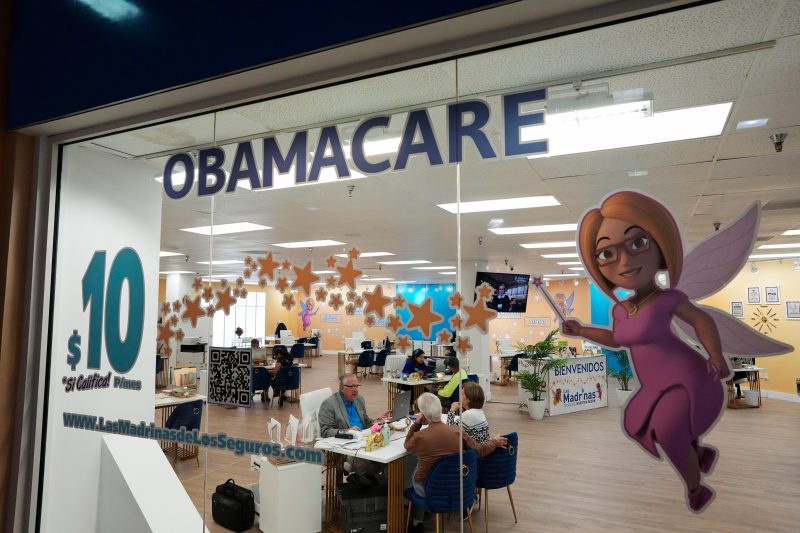Pakistan issues deadline for Afghan refugees after Trump blocks US resettlement pathway
Obamacare enrollment hits record level as Trump vows repeal


More than 21 million people have signed up for health plans through the Affordable Care Act’s health insurance marketplaces, the Biden administration announced Wednesday. The record level of enrollment comes as former president Donald Trump, seeking the GOP nomination, is again vowing to repeal the program if elected.
Sign-ups in the health insurance marketplaces — a jump of 5 million since last year and the third straight year of record enrollment — were partly driven by states “unwinding” pandemic-era protections in Medicaid, with millions of people culled from the safety net health program, said Biden officials and outside researchers. The enrollment figures reflect a roughly 80 percent surge in sign-ups for the ACA since President Biden took office in 2021 and expanded the subsidies available to consumers.
“[T]he American people have made it clear: they don’t want the Affordable Care Act weakened and repealed — they want it strengthened and protected,” Biden said in a statement.
The sweeping health program — which includes marketplaces for consumers to shop for health coverage, federal incentives for states to expand Medicaid and protections for people with preexisting health conditions — was viewed as President Barack Obama’s signature domestic achievement. It was immediately ensnared in political fights after its 2010 passage, as Republicans campaigned on pledges to “repeal Obamacare” and used the issue to help capture the House in 2010, the Senate in 2014 and the White House in 2016.
But the program survived multiple repeal efforts during Trump’s four years in office, and congressional Republicans have been wary about renewing their overhaul attempts, with polling on the issue strongly favoring Democrats. Many voters in recent elections have credited the health program for helping them gain coverage, and its favorability has steadily risen. About 6 in 10 Americans now say they have a favorable view of the program, according to polling by KFF, a health policy research group, compared with fewer than half of respondents to similar surveys between 2010 and 2017.
That has not dissuaded Trump, the front-runner for this year’s GOP presidential nomination, from resurrecting attacks on the health program.
“I don’t want to terminate Obamacare, I want to REPLACE IT with MUCH BETTER HEALTHCARE. Obamacare Sucks!!!” Trump wrote in a November 2023 post on Truth Social, his social media platform. Trump — who has spent the past decade pledging to repeal and replace the ACA — has yet to produce a health plan that would provide comparable health coverage at the same or less cost, analysts have said.
The Biden campaign and its allies have embraced the issue, running ads that highlight Trump’s recent attacks, point to the Affordable Care Act’s health benefits and incorporate Obama himself.
“At a time when more Americans are enrolling in the ACA than ever before, it is outlandish that the likely GOP nominee is even considering another attempt at repeal,” Brad Woodhouse, executive director of Protect Our Care, a Democrat-aligned health-care advocacy group, said in a statement.
About 3 in 5 voters — including 1 in 5 Republicans — trust Democratic politicians more than Republicans to handle the future of the Affordable Care Act, according to polling released last month by KFF. Seventy percent of Democratic voters said the health program is a “very important” issue for political candidates to discuss, compared with 45 percent of independents and 32 percent of Republicans, KFF found.
Enrollment has spiked in Midwestern and Southern states, such as Ohio and Texas, led by Republicans who spent years fighting the law before tamping down their criticism.
One reason for the Affordable Care Act’s growing popularity is its Medicaid expansion, which is separate from the private insurance sold on the marketplaces and has been credited with helping millions of low-income Americans gain coverage through government health programs. Overall Medicaid enrollment also ballooned to nearly 95 million people during the pandemic because of provisions that prevented participants from being disenrolled while the covid-era public health emergency was in effect.
Federal officials projected that about 15 million people would lose their Medicaid coverage after the Biden administration ended the public health emergency, and that nearly 3 million of those people would be eligible for subsidized coverage on the Affordable Care Act’s exchanges.
According to data through September, at least 1 million people who lost Medicaid coverage last year had signed up for Affordable Care Act health plans — a substantial number that was “still falling short of the expected pace” and meant that many Americans were becoming newly uninsured, Edwin Park, a Georgetown University health professor, wrote this month.
Under Biden, health plans in the Affordable Care Act have become more affordable. The American Rescue Plan Act of 2021, or ARPA, contained provisions that expanded the number of people who were eligible for Affordable Care Act health plan subsidies by about 20 percent, and the Inflation Reduction Act of 2022 extended those subsidies.
About 80 percent of shoppers on the Affordable Care Act’s health insurance marketplaces can find coverage for less than $10 per month, Democrats said Wednesday.
“In my district in Illinois, the average enrollee will save $1,020” when purchasing a health plan because of the subsidies, Rep. Lauren Underwood (D-Ill.) told reporters in a call organized by Protect Our Care on Wednesday. Underwood, who authored the legislation to expand access to the subsidies, warned that they were set to expire next year.
“Congress must build on the progress we’ve made and … make these tax credits permanent,” Underwood said.
Republicans said the program has become too generous in its subsidies.
“The main takeaway of ARPA: if people don’t have to pay anything for an ACA plan, they will finally enroll,” researchers at the Paragon Health Institute, a conservative health policy think tank, wrote in a post last week. “This seems more an indictment of the ACA than a victory.”











